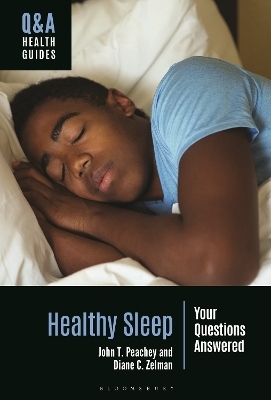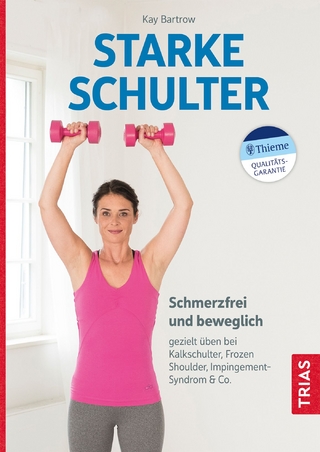
Healthy Sleep
Bloomsbury Academic (Verlag)
978-1-4408-7885-5 (ISBN)
Part of Bloomsbury’s Q&A Health Guides series, this book aims to educate teens and young adults about the importance of sleep through an engaging question-and-answer format. The book’s 44 questions cover the basics of sleep and dreaming, the connection between sleep and health, sleep problems and disorders, and how to improve sleep:
- Why exactly is sleep so important?
- How does not getting enough impact physical wellbeing, academic performance, and interactions with others?
- How do you know if you have a sleep disorder?
- Can caffeine and power naps really make up for poor sleep habits?
The text strikes a balance between theory and practice, offering both clear explanations of foundational concepts in sleep science and useful suggestions that readers can implement in their own lives.
Augmenting the main text, a collection of 5 case studies illustrate key concepts and issues through relatable stories and insightful recommendations. The "Common Misconceptions" section at the beginning of the volume dispels 5 long-standing myths about sleep, directing readers to additional information in the text. The glossary defines terms that may be unfamiliar to readers, while a directory of resources curates a list of the most useful sleep-related books, websites, and other materials. Finally, whether they’re looking for more information about sleep or any other health-related topic, readers can turn to the "Guide to Health Literacy" section for practical tools and strategies for finding, evaluating, and using credible sources of health information both on and off the Internet.
John T. Peachey is a medical psychologist and coauthor of Greenwood's What You Need to Know about Sleep Disorders (2021). He has coauthored multiple sleep research articles, developed and taught courses in sleep at several universities, and was selected as a William C. Dement Fellow for sleep research. He completed a fellowship in behavioral sleep medicine at Stanford University's School of Medicine and has worked internationally in military medicine. Diane C. Zelman is a professor in the PhD Program in Clinical Psychology at Alliant International University's California School of Professional Psychology, USA. She is also an assistant clinical professor in the Department of Family and Community Medicine at the University of California, San Francisco, USA. She has published extensively on topics in health psychology, particularly in studies of sleep, chronic pain, and addiction. She is coauthor of Greenwood's What You Need to Know about Sleep Disorders (2021).
Series Foreword
Acknowledgments
Introduction
Guide to Health Literacy
Common Misconceptions about Healthy Sleep
Questions and Answers
The Basics of Sleep and Dreaming
1. What is sleep?
2. What is the sleep cycle and the difference between sleep stages?
3. Why do we need sleep and is it possible to train your body to sleep less?
4. Why do we get sleepy?
5. If I skip a night of sleep or “pull an all-nighter,” how long does it take to “catch up” on lost sleep?
6. What is the ideal sleep environment?
7. Is it true that people in the past got much more sleep than we do today?
8. How does sleep change over a lifetime?
9. I can’t get to sleep before midnight and then I like to sleep until late in the morning—isn’t that normal for teenagers?
10. Why do we dream?
11. Can you learn to influence or control your dreams?
The Connection between Sleep, Health, and Performance
12. How do sleep and physical health interact?
13. How does sleep influence athletic performance?
14. Does sleeping help you learn and remember things?
15. What is the relationship between sleep and mental health?
16. How does sleep affect our relationships with others?
17. How is sleep influenced by my period?
Sleep Problems, Disorders, and Unusual or Embarrassing Experiences
18. What is a sleep disorder, and which sleep disorders are most common in teenagers?
19. How do doctors measure sleep and diagnose sleep disorders?
20. How do watches and other wearable devices that measure sleep work, and should I use one?
21. Why am I sleepy all the time?
22. Why do I have so much trouble getting to sleep at night?
23. Why do I keep waking up throughout the night, and how do I stop this?
24. What is the best way to fight jet lag and shift-work problems?
25. Why do people snore or stop breathing in their sleep, is it dangerous, and how can it be prevented?
26. Why do some people kick or move around in their sleep?
27. What is the difference between a nightmare and a night terror?
28. Sometimes at night I see or hear scary things in my bedroom, and I cannot move at all—am I going crazy?
29. Why do I have “wet dreams” or wake up in the morning with an erection?
30. Sometimes I pee in my bed while asleep—how can I stop doing this?
31. Why do people sleepwalk or talk in their sleep, and is this unsafe?
32. Is it true that people can do violent things in their sleep?
33. Why do I grind my teeth while sleeping, and how can I stop it from hurting my jaw in the morning?
Improving Your Sleep
34. Which sleep aids are the safest and most effective?
35. How do alcohol and cannabis affect sleep?
36. How do coffee and energy drinks keep you awake, and can they negatively affect your sleep?
37. Is a “coffee nap” a good strategy to reduce the risks of drowsy driving?
38. How do my daily habits, like exercise and what I eat, influence my sleep or dreaming?
39. What are the best ways to get to sleep at night?
40. Why don’t the sleep-hygiene tips I read online work?
41. Why do people say that using the computer or a smartphone before bed is bad for you?
42. Why can’t I get out of bed on time, and why do I turn off the alarm without even realizing it?
43. How can I train myself to wake up earlier and remain awake and alert?
44. Is there anything I can do to stop having bad dreams?
Case Studies
Glossary
Directory of Resources
Index
| Erscheinungsdatum | 05.12.2023 |
|---|---|
| Reihe/Serie | Q&A Health Guides |
| Zusatzinfo | 1 bw illus |
| Verlagsort | London |
| Sprache | englisch |
| Maße | 156 x 235 mm |
| Themenwelt | Sachbuch/Ratgeber ► Gesundheit / Leben / Psychologie ► Krankheiten / Heilverfahren |
| Sachbuch/Ratgeber ► Gesundheit / Leben / Psychologie ► Lebenshilfe / Lebensführung | |
| Kinder- / Jugendbuch ► Sachbücher ► Körper / Sexualität | |
| Geisteswissenschaften ► Psychologie ► Biopsychologie / Neurowissenschaften | |
| Medizin / Pharmazie ► Medizinische Fachgebiete | |
| ISBN-10 | 1-4408-7885-4 / 1440878854 |
| ISBN-13 | 978-1-4408-7885-5 / 9781440878855 |
| Zustand | Neuware |
| Haben Sie eine Frage zum Produkt? |
aus dem Bereich


